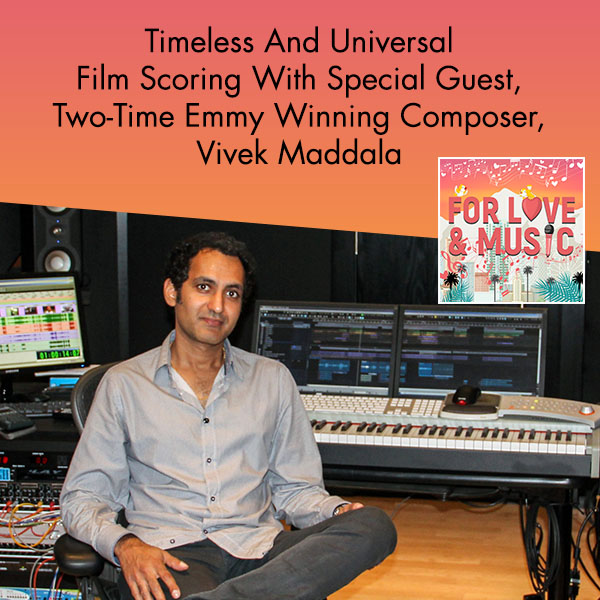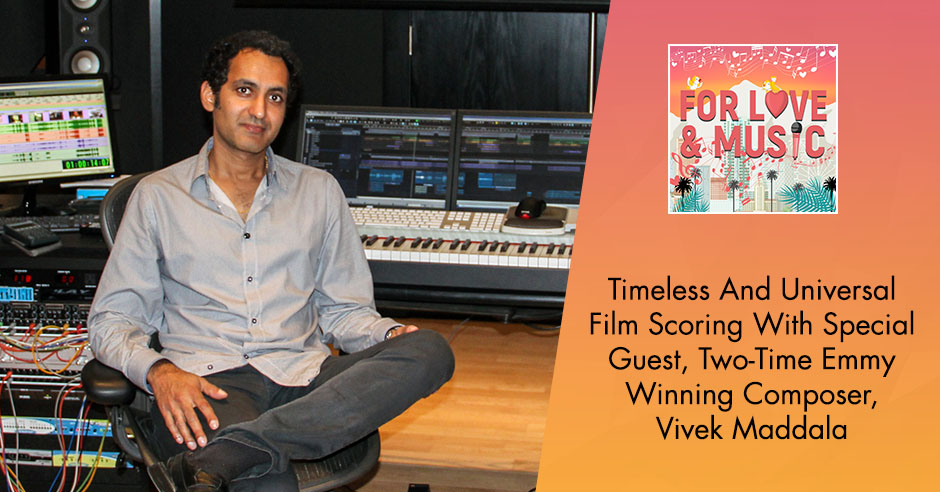
In contemporary film scoring, we have seen changes that have blurred the line between the roles of composer and producer. Vivek Maddala, who joins Tara Joseph in this episode, believes it is not only necessary but also unavoidable to wear both hats at the same time. Vivek is a two-time Emmy winning composer with his scores for the Tom and Jerry show. He also composed the score for the inspirational PBS documentary, The Asian Americans. He takes us through the process of writing scores for all media and describes how musical score drives the message of the film and influences how the audience interprets it. Join in and listen to one of the best!
—
Listen to the podcast here:
Timeless And Universal Film Scoring
With Special Guest, Two-Time Emmy Winning Composer, Vivek Maddala
I’m hoping that everyone is staying safe and healthy during these challenging times. What better way to brighten up all of our days than to welcome to this show my special guest, two-time Emmy winning composer, Vivek Maddala. How are you?
I’m doing well.
Vivek, welcome to the show.
I’m glad to be with you.
Tell me, how are you coping with lockdown? How are you being affected by everything?
I’m doing okay. As I’m sure you know, the life of a film composer is one of seclusion by design. It hasn’t affected me that much in terms of my day-to-day work or my day-to-day existence. Generally, when I’m working, I record a lot of musicians here. I have my own mini-scoring stage. Often, I’ll have a lot of musicians coming over, which is not happening now. I’m doing more remote sessions, which is its own thing and it’s fun, but it does create a whole other layer of work. The musicians who I record, each of them is in their own house or apartment with their own microphones and their own environment.
When I get their tracks, I have to make everything sound cohesive, which is a whole other subproject. I’ve been quite fortunate. I’m one of the most privileged people in this environment because I can work from home and have the luxury of being able to do that. I think a lot about people don’t have that luxury, not just in the US, but all over the world. I live here in Los Angeles and we have a large homeless population. I see them socially distancing, but that’s hard. Think about people who are in prison. How are you doing the social distance in prison? There are a lot of people for whom this is going to be and is already quite difficult.
One of the things that I think about is the couples that are in lockdown, who have a domestic violence situation, where there are children in that situation as well and they can’t escape. All of the elements that you were talking about added with that. Financially, it makes it a difficult time for a whole lot of people. If you are in a fortunate position such as yourself where you’re used to choosing isolation where you can continue to be creative, that’s wonderful for you. Do you find though that the creative process is emotionally different? You’re working with people remotely, but when you’re in chosen isolation, it’s up to you. When you’re in forced isolation, do you feel that dampens your creative juices in any way?
I hadn’t thought of that. I can speak for myself, but it’s probably more generalizable. Whatever is happening for any given individual in their life, it’s going to affect what they do creatively. When I’ve fought with someone for example or if I’m feeling particularly jubilant or particularly down, that greatly affects what I end up doing creatively. It probably is affecting me in various ways that I’m maybe not even yet acknowledging. It’s true though that as a composer, a lot of what I end up doing is relying on technique and it is what it is. I have certain ways that I orchestrate and certain ways that I hear harmony, and that’s probably not going to be that affected by the pandemic.
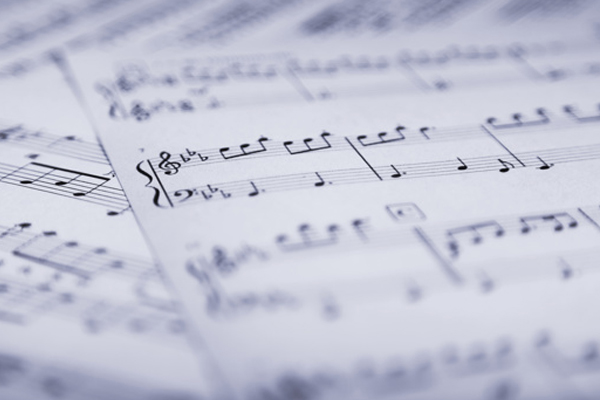
Although interestingly, I am trying to take this opportunity to do things that I often don’t do because maybe I have the luxury of a little more time as a lot of things are shut down. I am reading things that I’ve wanted to read for years that may be affecting me in some way and listening to music that is not for utilitarian purposes, but just for pleasure. I’m exploring music from around the world that I often maybe wouldn’t ever hear, specifically seeking out different modalities and things that undoubtedly are going to affect me in some way.
You’re an award-winning composer, but you also mentioned that you’re producing for different artists. What sorts of artists are you working with?
I can mention a couple of things. I work with the group, String Theory. I don’t know if you’re familiar with them. We’ve been doing some remote recordings together where each of us is recording our parts in our own little silos. That’s been a lot of fun. I’ve been producing a record with my colleague, Gingger Shankar, who has a record deal with Concord Jazz label. I’ve been working on that as well. Those are maybe the two most active projects that I can probably discuss.
They both sound fascinating, and Concord is an amazing label. For those people reading out there who might want to get into producing and composing, what advice would you give? Do you have a different process when you’re composing to producing? I know that there’s a different process, but to the world who maybe doesn’t know, how would you explain the difference? What words of wisdom could you share?
It used to be that composing music and producing music were different tasks, and you had different people with different job functions doing those things. As budgets have shrunk and as the recording industry has mostly gone away, a lot of those jobs have collapsed into having the same individual may be wearing multiple hats. For me, the process of writing and producing music is not different at all. They’re part of the same thing. In fact, when I’m writing, I’m producing at the same time. To use an analogy, traditionally, composing music would be like what a screenwriter would do in a film, and producing music would be like what a director would do.
There are a lot of writers and directors who do both. Increasingly being a film composer in particular or composer for media, you are necessarily having to produce at the same time. If not at the same time, as part of your responsibilities. In my case, I don’t separate them at all. In fact, I do everything at the same time. Writing, performing, orchestrating and producing is difficult for me to tease those components apart because they are threaded together tightly.
Following on from that, we must talk about the fact that you won two Emmys for The Tom and Jerry Show on the Cartoon Network, which is fabulous. I love that. When you are presented with this opportunity, how did you go about creating what you created? We’ve all lived with Tom and Jerry and it is featured in our lives in one way or another. For you to create new music for this particular show, it must have been an exciting and rewarding experience, particularly to receive two Emmys.
The Emmys came as a surprise. I had no expectation that was going to happen. In fact, when I won the first of the two Emmys, I almost didn’t go because one, people were saying, “You’re never going to win this thing. It’s such a long shot.” Frankly, I was busy. I had impending deadlines. To take off half a day, go to the thing and put on a tuxedo, I figured, I don’t have the luxury of being able to do that because of the time pressures I was under. This is a funny story. I didn’t buy a ticket or anything and then last minute I realized, “I probably should go because I knew two of the other nominees. One of them will likely win and I should go and support them.”
Whatever is happening for any given individual in their life, it's going to affect what they do creatively. Click To TweetIt felt like I wanted to be a team player and I wanted to be part of this communal experience, so I put the tuxedo in the car. I rushed off to the convention center and I changed into the tux in the bathroom. I went up to the will-call window and played dumb. I knew I didn’t have a ticket but I didn’t say that. I said, “I don’t have a ticket, but can I get into the show?” They said, “It’s sold out and you need a ticket.” I said, “I’m up for an award. There’s my name on the list.” The soap operas are done out of New York. The people flew out from New York and somebody didn’t fly out from one of the soaps. There was an empty seat in the soap opera section.
They stuck me in the soap opera section, so I was sitting between the Bold and the Beautiful and Young and the Restless. I befriended these two gentlemen sitting to my right who were from one of the soap operas. This was all a foreign experience for me. When they got to my category, they announced all the shows alphabetically and the nominees alphabetically. The first one was a Disney show and there’s an HBO show and Netflix show, and they get to my show. Tom and Jerry was the last alphabetically in the list. Whenever they announce a nominee, there’s this big applause.
They get to The Tom and Jerry Show and it’s radio silence. It was pathetic, except for the two guys sitting next to me who I befriended. They were my cheering section. The fact that it was radio silence, except for these two people applauding, made it that more comical. People started laughing at the fact that I only got two people and it was sad. When they announced that it was The Tom and Jerry Show, there was this gasp over the audience. I was appalled and I hadn’t written a speech. I didn’t know what I was doing, so I stumbled up there. I couldn’t remember anyone’s name. I was like, “I’d like to thank the people at Warner’s.” I couldn’t remember what’s next.
You won and that’s the most important thing.
It was a big shock. The second-year was also a big shock because I assumed the first one was a fluke. I don’t have a good explanation for it. I don’t know how this has happened.
You need one. It clearly was fantastic music and you deserve to win both times.
Thank you for saying that. To answer your original question, which was specifically about the music for the show. One of the early pieces of direction that I got from the director was to go back to those classic episodes from the 1940s. The Tom and Jerry Show wasn’t even The Tom and Jerry Show. The first episode wasn’t even an episode. It predated television. The first short was in December of 1940. They made something maybe two a year. They didn’t make that many of them. They were short films that were shown before feature films and the first one was December of 1940. They’re beautifully hand-drawn and the music scores by Scott Bradley were gorgeous.
The cartoons themselves are sweet and clever. It was great storytelling. Subsequent generations of the show somehow, maybe by the 1960s, reconfigured the show. It developed a reputation for horrendous cartoon-style violence. Unfortunately, a lot of people think of that horrendous violence as being a defining characteristic of the show. I joined in 2016 when they retooled the reboot of the show with all-new stories and all-new animations. They are trying to make it more like the original show from the 1940s and 1950s where it’s good storytelling. Tom and Jerry, the cat and the mouse have this rivalry but sometimes, they work together to solve a problem. They’re working in concert to achieve some mutually beneficial goal or something.
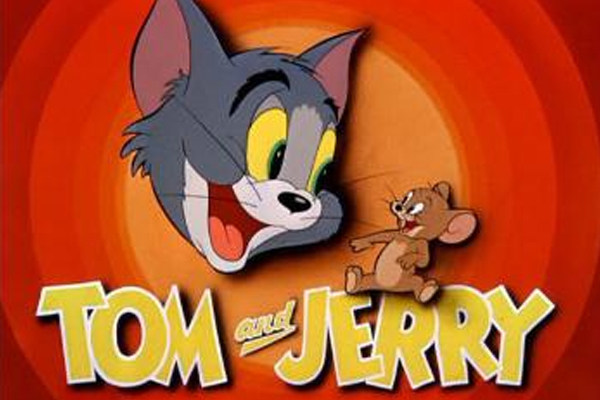
There is sometimes cooperation between them but ultimately, they do have this rivalry. The music is drawn a lot from that original classic 1940s cartoon tradition where the music is precisely sculpted to every dramatic contour and every physical action on the screen. At the same time, it’s telling the story. There’s a lot of melody and counterpoint all the time. Like the Original Score, it’s drawn from the late 19th century romanticism and 20th century early jazz and certainly from big band and early bebop, Ella, Charlie Parker, Art Tatum and so on. In the intervening, a lot has happened musically and culturally. Every now and then, I’ll put in a Jimi Hendrix reference, or there was one episode where I did this whole Soundgarden ‘90s, indie rock thing. Musically, it can be quite diverse.
You’ve been described as being the bleeding edge of hip and that your music is timeless and universal. Is that something that fits into that time or that covers you in an entirety?
I would say more the latter than the former. What’s interesting is timeless and universal came from an NPR interview that I did in 2005, having to do with silent film scores that I had been doing. How I got my start in film scoring was through silent films. The job there was to bring these classic 1920s silent films into the new century. I was drawing from things that you would have heard say, 100 years ago, but also more modern things. There was a way in which the music needed to be timeless and universal. In 2010 or 2011, I scored Gregg Araki’s film, Kaboom. There were 80 minutes of music in a 90-minute film. It was wall-to-wall almost.
Roger Ebert, in his review of the film, he almost never talks about music but oddly enough, he referenced the music score in his review of the film. I don’t know that it was a complimentary reference, but I figured I might as well assume that it is. It was not a positive review of the film. It was a mixed review, but he was talking about aspects of the movie that were edgy and forward-thinking. One of the aspects he was describing was the music and he described it as bleeding edge of hip. I took that as a compliment. I don’t know that he intended it as such but I like the phrase and the fact that Roger Ebert, who almost never talked about music, did in this instance. I decided to excise that quote.
It’s a great quote. One of the things that we must talk about is your Asian-Americans show for PBS. This is a big project. The music that you’ve created is 4.5 hours long. Is that right?
Yes.
Tell us about that.
It’s a miniseries with five one-hour episodes. These are PBS episodes, so they’re 55 or 56 minutes long and it’s about 4.5 hours of music altogether. The show deals with a lot of immigration and diasporic themes, having to do with the Asian-American experience. The subject is Asian-American immigrants and the Asian-American experience. A lot of the concepts and a lot of the ideas could be understood more broadly. When you think about the history of immigration in the US, it’s not a pleasant history, even to the present day. There’s been a lot of subjugation and oppression.
Writing and producing music are two sides of the same coin. Click To TweetOne of the things I like about the show is that while it does deal starkly with a lot of the reality that immigrants faced and people of non-European origin have faced in the US, it is a fairly joyous, jubilant and encouraging show. It deals with a lot of historical things that a lot of Americans may not be aware of. Most people are familiar with things like the Chinese Exclusion Act, the Japanese internment camps and so on. I’m finding, for example, a lot of Americans are not familiar with the history of European imperialism vis-à-vis the Philippines. The US invaded the Philippines in the late 19th century. It was a 46-year brutal occupation.
It’s connected to the immigration patterns of Filipinos over subsequent generations in the US. There are things historically that a lot of Americans are not familiar with but also, the show is smart in how it connects. It invites the audience to connect dots without telling them to connect them. For example, if you think about detention camps along the southern border of the US, one can reasonably find connections between historical events in those detention camps, which are horrible and brutal.
That’s an interesting point because whilst we’re living through lockdown, no one’s mentioned what’s going on with those camps along the border.
The US corporate media is not focusing on that much. In the early days, there was some discussion about it that I was reading. One of the nice things about the show, in my view, is that we’re planting seeds for the audience to connect the dots in their own way, or to not connect the dots if they choose not to. One of the things about documentaries in general and music scores for documentaries is that modern audiences are sensitive to feeling manipulated by music, understandably and correctly.
When you’re scoring a documentary like this, you have to be careful about calibrating exactly what you’re saying and what you’re not saying. It’s almost like half-posing questions that the audience can then answer themselves. I feel like both the music and the storytelling in general, we were deliberate about how we’re connecting the dots between things, planting seeds, and foreshadowing things. Also, how we’re alluding to disparate ideas in different time periods with different cultures but inviting the audience to make their own connections.
How long did it take you to score it?
I started in earnest in late October to early November, and I turned in the final episode in mid-March, so five months.
To me, that seems like wow to have done all of that within that period of time. Maybe that’s a normal period of time. To me, it sounds overwhelming but then I’m not a composer.
It was a brisk pace. In that window of time, a light workweek was around 80 hours and it went up to about 140. The hard weeks were intense.
I’m excited to watch it.
It’s a good show and you’ll be surprised.
I’m sure, I and our audience will learn a lot.
I hope so. The show works on a visceral level, so it’s not only about the information, but it’s about the way in which the Asian-American experience. I’m being a bit reductive in calling it the Asian-American experience as though there’s one monolithic experience, but there’s not. This opens up a whole other series of questions like, “What does Asian-American even mean? Geographically, what are we talking about?” In the case of this show, it goes as far east as Japan and the Philippines and as far west as South Asia.
The history of Japanese immigration to the US is going to be quite different than that of different waves of Chinese immigrants or Vietnamese immigrants and so on. One of the things that the show handles well is it’s based on time period rather than geography. It does invite the audience to think about the Asian rather than Asian-Americans’ experiences within the context of our larger concept of humanity. It’s also an entertaining show. It was fun to score, so it will be fun to watch as well.

I’m looking forward to it. I have to ask one last question. The show is called For Love And Music, which some of the readers will know the two reasons that I moved from London in the UK to LA. I generally ask my guests, throwing in the love question, has love ever guided or helped you make an unexpected career decision?
The answer is an unequivocal, yes. Love can be defined in different ways and there are different kinds of love. There’s interpersonal love and there’s also love for principles. In my case, I’ve had different kinds of combinations of intersecting kinds of love. There’s the obvious one, which was how I ended up moving to Los Angeles.
Where did you originate from?
I moved to Los Angeles from San Francisco, which was not a huge move. It felt like a huge move, but it’s 5 or 6 hours away. I had a thing going on there that I had to negotiate before coming here. I’m being vague here and I’m not sure what I can say. My girlfriend at the time, we were trying to negotiate, “Do we live together? Do we not?” and so on and so forth. My girlfriend at the time, who’s now my wife, she moved down. There’s a direct answer to your question in that.
It sounds direct. That’s the reason I moved. Loved, got married to a Californian and here we all are.
There are other more oblique answers to your question though that probably involves human psychology and philosophy, and things of that nature.
I’m fascinated and I am going to have to do round two. Thank you for coming onto the show. You’re talented, and I can’t wait to watch the Asian-Americans show on PBS. I’m sure the audience will find it fascinating as well. Stay safe and healthy. Thank you to all our readers. Bye for now.
Important Links:
About Vivek Maddala
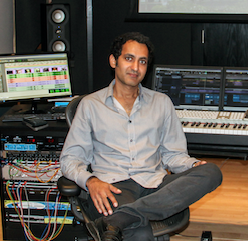 Vivek Maddala is a two-time Emmy-winning composer who focuses on scoring feature films, theater and dance productions, and television series. Additionally, Vivek works with several acclaimed artists as a music producer and engineer. As a multi-instrumental performer, Vivek journeys fluidly through diverse musical styles, and effortlessly between many instruments — including drums, piano, guitar, and bass. He has also served as a guest conductor with renowned orchestras and chamber groups, performing work he has written for ballet and film.
Vivek Maddala is a two-time Emmy-winning composer who focuses on scoring feature films, theater and dance productions, and television series. Additionally, Vivek works with several acclaimed artists as a music producer and engineer. As a multi-instrumental performer, Vivek journeys fluidly through diverse musical styles, and effortlessly between many instruments — including drums, piano, guitar, and bass. He has also served as a guest conductor with renowned orchestras and chamber groups, performing work he has written for ballet and film.
Vivek is a Sundance Institute Lab Fellow for film composition, and has had work premiere at the Cannes, Toronto, Berlin, Venice, and Sundance film festivals. His diverse musical palette, combining melodic symphony writing with modern textures from around the globe, has been described paradoxically as “the bleeding edge of hip” (Roger Ebert) and “timeless and universal” (NPR).
When scoring films, Vivek speaks with his unique musical voice. His score for the Peabody Award-Winning film “American Revolutionary” blends melodic chamber strings with expressive piano passages to frame the film’s exploration of critical social movements seen through the lens of a revolutionary activist and philosopher. Vivek’s brooding, passionate score for “Children Of Memory” carefully fuses indigenous musical textures with his focused, yet sweeping composition style to explore questions of how post-war societies can right the wrongs of the past. Accordingly, Vivek continues to seek out projects that lift the human spirit — to challenge power structures and elucidate the human condition. His works, extraordinarily diverse in style, stand out among contemporary compositions for their depth of expression, brilliance of sound, and profoundly compassionate nature. His music supplements and strengthens the narrative and emotional components of the film, characterizing and framing the picture — above all, serving the dramatic vision of the director.
Recently, Vivek composed the four-and-a-half-hour music score for “The Asian Americans,” a sweeping historical series chronicling over two centuries of immigration/diasporic themes. The music boldly reflects and affects the series’ exploration of new perspectives that recalibrate the way we look at immigrant experiences. It will premiere May 11-12 on PBS.
In addition to music, Vivek earned degrees in electrical engineering and applied physics, and has worked as an engineer and research scientist for Tektronix, Dolby Laboratories, and Avid, where he developed audio technologies and designed ground-breaking pro audio gear. He holds a half dozen patents in the fields of electromagnetics and high-frequency analog processing.

